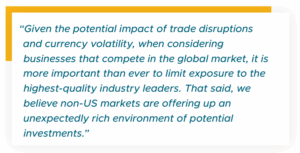Perspectives
Keep
Reading

Global Equity Market Commentary – 4Q 2025
Global Equity | InsightGlobal equities rose in 2025, with non‑US markets outperforming as shifts in trade, currency, and valuations created compelling international opportunities.
Read Article
Global Equity Market Commentary – 3Q 2025
Global Equity | InsightGlobal small caps rose in 3Q2025. Our team favors steady, undervalued companies, choosing to focus on fundamentals over market hype.
Read Article
Global Equity Market Commentary – 1Q 2025
Global Equity | InsightGlobal equity markets (ex-USA) were higher to start the year, with particular strength in Europe.
Read ArticleThis Website Uses Cookies
We use cookies to improve your experience on our website. To accept cookies click Accept & Close, or continue browsing as normal. For more information or to learn how to opt out of cookies, please see our cookie policy.
Accept and Close-
Latest Insight
Long-Term Care Insurance Basics
Wealth Insights
Long term care planning matters more than many realize. GW&K’s Matt Shumaker answers key questions on costs, coverage, and timing.
Read Article
Global Equity Market Commentary – 2Q 2025
Despite starting the quarter with a tariff shock and enduring a—thankfully—short Iranian conflict, the global markets (ex-USA) put up stellar returns for the quarter, at least when measured in US dollars. The large cap, MSCI World ex-USA Index rose 12.1%, but it was eclipsed by the 16.8% return from the MSCI World Small Cap ex USA Index. Dollar weakness (-7.0% as measured by the DXY) continued for the second straight quarter.
For the MSCI World Small Cap ex USA Index, all regions had solid double-digit returns. Israel was a standout performer on hopes for regional stability following what appears to be a swift end to the Iran conflict. This reflects the potential for Israeli companies, which have long operated within a small, constrained market, to prosper in a more peaceful and much larger region. Despite a sizable US tariff threat on the Eurozone that was quickly retracted, Europe was the top performing major region with attractive valuations, improving earnings, and stimulus hopes as the key takeaways. North American and Asian small-cap stocks also put up double-digit returns. Japanese small caps lagged other markets, but still managed a respectable gain, though trade negotiations with the US appear stalled over key concerns, such as 25% auto tariffs. Although the yen has been on a strengthening trend, the Bank of Japan kept rates on hold due to growth concerns associated with trade uncertainty and the scars from previous premature hiking cycles.
For US investors, currency levels are seldom top-of-mind, but they can be a significant driver of performance during periods of US dollar weakness. Most investors understand the translation effect where local stock returns are multiplied by the foreign exchange (FX) impact, creating a performance tailwind when the home reporting currency is weak and a headwind when strong. US investors in foreign markets have endured this headwind on average for the last 15 years. On the other hand, the transaction impact of stronger foreign currencies can make exporters less competitive. Active management can mitigate transactional currency risk through careful stock selection that balances portfolio exposure to exporters and domestically focused businesses. In addition, being the reserve currency means that when the US dollar is weak there are two additional positive impacts for non-US companies. First, most commodities and globally-traded services are priced in US dollars. As a result, most companies see cost reductions, and hence higher earnings during periods of dollar weakness. Second, companies that fund themselves with US dollar borrowing will see liabilities fall along with the US dollar, this is especially true in developing markets. It is important to stress that FX considerations should not alone drive investment decisions but should be considered, especially if long-lived trends look to be reversing.
Given the potential impact of trade disruptions and currency volatility, when considering businesses that compete in the global market, it is more important than ever to limit exposure to the highest-quality industry leaders. That said, we believe non-US markets are offering up an unexpectedly rich environment of potential investments. Normally in the later stages of an economic expansion the opportunity set contracts, but we are currently finding the opposite with an abundance of attractive investment opportunities.
Over the long term, we expect global small-cap markets to deliver solid returns. Non-US markets could get a boost from monetary easing and fiscal stimulus in Europe, potential business reforms in some regions, and capital returning from the US, where foreign ownership had hit record levels. In the US, future rate cuts and greater clarity around government policy could support small-cap stocks, which have lagged the S&P 500 in recent years.
Disclosures
This represents the views and opinions of GW&K Investment Management and does not constitute investment advice, nor should it be considered predictive of any future market performance. Data is from what we believe to be reliable sources, but it cannot be guaranteed. Opinions expressed are subject to change. Past performance is not indicative of future results.
Indexes are not subject to fees and expenses typically associated with managed accounts or investment funds. Investments cannot be made directly in an index. Index data has been obtained from third-party data providers that GW&K believes to be reliable, but GW&K does not guarantee its accuracy, completeness or timeliness. Third-party data providers make no warranties or representations relating to the accuracy, completeness or timeliness of the data they provide and are not liable for any damages relating to this data. The third-party data may not be further redistributed or used without the relevant third-party’s consent. Sources for index data include: Bloomberg, FactSet, ICE, FTSE Russell, MSCI and Standard & Poor’s.